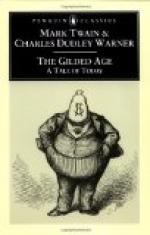The front and right hand views give you the city at large. It is a wide stretch of cheap little brick houses, with here and there a noble architectural pile lifting itself out of the midst-government buildings, these. If the thaw is still going on when you come down and go about town, you will wonder at the short-sightedness of the city fathers, when you come to inspect the streets, in that they do not dilute the mud a little more and use them for canals.
If you inquire around a little, you will find that there are more boardinghouses to the square acre in Washington than there are in any other city in the land, perhaps. If you apply for a home in one of them, it will seem odd to you to have the landlady inspect you with a severe eye and then ask you if you are a member of Congress. Perhaps, just as a pleasantry, you will say yes. And then she will tell you that she is “full.” Then you show her her advertisement in the morning paper, and there she stands, convicted and ashamed. She will try to blush, and it will be only polite in you to take the effort for the deed. She shows you her rooms, now, and lets you take one—but she makes you pay in advance for it. That is what you will get for pretending to be a member of Congress. If you had been content to be merely a private citizen, your trunk would have been sufficient security for your board. If you are curious and inquire into this thing, the chances are that your landlady will be ill-natured enough to say that the person and property of a Congressman are exempt from arrest or detention, and that with the tears in her eyes she has seen several of the people’s representatives walk off to their several States and Territories carrying her unreceipted board bills in their pockets for keepsakes. And before you have been in Washington many weeks you will be mean enough to believe her, too.
Of course you contrive to see everything and find out everything. And one of the first and most startling things you find out is, that every individual you encounter in the City of Washington almost—and certainly every separate and distinct individual in the public employment, from the highest bureau chief, clear down to the maid who scrubs Department halls, the night watchmen of the public buildings and the darkey boy who purifies the Department spittoons—represents Political Influence. Unless you can get the ear of a Senator, or a Congressman, or a Chief of a Bureau or Department, and persuade him to use his “influence” in your behalf, you cannot get an employment of the most trivial nature in Washington. Mere merit, fitness and capability, are useless baggage to you without “influence.” The population of Washington consists pretty much entirely of government employee and the people who board them. There are thousands of these employees, and they have gathered there from every corner of the Union and got their berths through the intercession (command is nearer




